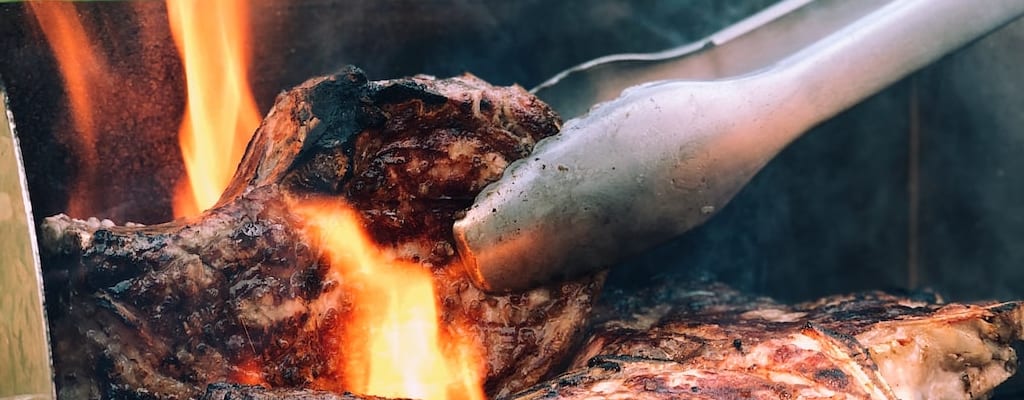eat one’s head off: Idiom Meaning and Origin
What does ‘eat one's head off’ mean?
The idiom "eat one's head off" means to consume something excessively or without restraint, often referring to a person or an animal consuming food in large quantities. It emphasizes the idea of extreme or voracious eating.

Idiom Explorer
The idiom "take someone's head off" means to yell or speak to someone angrily or aggressively.
The idiom "laugh one's head off" means to laugh uncontrollably and excessively.
The idiom "I could eat a horse" means to be extremely hungry, indicating that one's appetite is so intense that they could consume a large amount of food, even as much as an entire horse.
The idiom "hand someone his head" means to defeat or humiliate someone completely, usually in a competition or conflict.
The idiom "hand over head" refers to doing something quickly or without care, often in a hurried or reckless manner.
The idiomatic expression "go to someone's head" means that success or praise can make a person arrogant or overconfident, leading them to have an inflated sense of importance or superiority.
The idiom "get one's head around" means to understand or comprehend something that is difficult or complex.
The idiom "fill one's face" means to eat a large amount of food quickly and greedily.
The idiom "fill one's face" is a commonly used expression in the English language. It is an informal phrase that is typically used in casual conversations to describe someone who is enjoying a meal to the fullest, without concern for moderation or manners.
The idiomatic expression "eat someone's lunch" means to defeat or outperform them, typically in a competitive or confrontational situation.
Curious Inquiry
The idiom "eat one's head off" is a commonly used phrase with a figurative meaning. It originated in the English language in the late 19th century.
This idiom is used to describe a person who is excessively demanding, nagging, or giving relentless instructions or advice. When someone says that another person is "eating their head off," it means that the individual is incessantly talking or pressuring someone else, causing annoyance or frustration.
The origin of this idiom is unclear, but it may have emerged as a metaphorical expression within spoken language. It could be a creative adaptation of the more literal idiom "eat one's heart out," which conveys a sense of consuming one's own emotions or torment.
While "eat one's head off" is a figurative phrase, it allows for different nuances and shades of meaning depending on the speaker's tone and the specific situation. It is widely understood in contemporary language and is often used in informal conversations, storytelling, and even in written texts.
In addition to "eat one's head off," there are other related idioms that share a similar theme. One such idiom is "bite someone's head off." This phrase is used to describe a person who responds to someone else's comment or question in a harsh or aggressive manner. It implies that the person is verbally attacking the other individual, much like biting off their head.
Another related idiom is "take someone's head off." This expression is used to describe a person who reacts with extreme anger or aggression towards someone else. It suggests that the person is so enraged that they figuratively want to remove the other person's head.
Lastly, there is the idiom "eat one's young." This phrase is used to describe a situation where a person destroys or undermines the very thing or person they should be protecting or nurturing. It is often used metaphorically to describe someone who is destroying their own creation or causing harm to their own children or offspring.
These related idioms share a common theme of aggression or destruction. While "eat one's head off" specifically refers to someone who is demanding or talking excessively, "bite someone's head off" and "take someone's head off" both describe extreme anger or aggression towards others. Additionally, "eat one's young" refers to self-destructive behavior or harming one's own creation or offspring.
The idiom "eat one's head off" is a figurative expression that has become embedded in American English. Its origins remain somewhat mysterious, but it is widely understood to refer to someone who is excessively demanding or incessantly pressuring others. While the idiom's literal interpretation may seem absurd, it serves as a powerful metaphor to convey the idea of being overwhelmed or irritated by someone's persistent behavior. Its enduring popularity suggests that it resonates with people and continues to be a relevant and useful idiom in contemporary language.
Example usage
Examples of how the idiom "eat one's head off" can be used in a sentence:
- She complained so much that she ate my head off. (This example suggests that someone complained excessively or angrily to the point of bothering or irritating another person.)
- Don't let your worries eat your head off. (This example implies that one should not allow their worries or anxieties to consume them mentally.)
- The boss really ate my head off when I made that mistake. (This example illustrates getting scolded or harshly reprimanded by one's superior for making an error.)
More "Food" idioms

